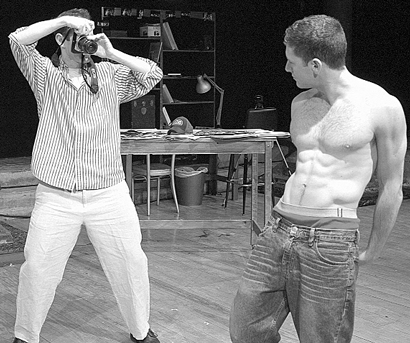Michael Lewis Maclennan’s play is a lyrical exploration of isolation
Fear, shame, rage and violence pervade Michael Lewis Maclennan’s “The Shooting Stage.” The consummate irony, however, is that these harrowing emotions and the damage that results are all the result of the characters’ search for truth, love, connection and art.
In his often lyrical and cinematic script, Maclennan pointedly traces parallel stories—one of two former child stars, who played brothers on a long defunct TV show, reunited when the older brother, Malcolm, now a lawyer, helps his younger brother, Len, now a photographer, beat an obscenity suit involving his art photography of Malcolm when they were teenagers. At the same time, the play tells the story of three high school friends wrestling with their demons of gay sexuality, identity and the desire to escape the confines of the farming community where they live.
Elliot, who is Malcolm’s son, wrestles with his sexuality and gender identification, while Ivan, a future pig farmer who wants to be a model, lives in denial of his homosexuality and Derrick, a boy defined by his anger, is defiant and hostile, using adolescent sex to vent his self-loathing. As the secrets each character harbors are revealed, the result is either healing or destruction.
Maclennan, known primarily as a screenwriter and supervising producer of Showtime’s “Queer as Folk,” translates screen techniques to the stage with remarkable facility and insight. His precise and economical writing allows the characters to emerge fully while creating a spare lyricism that is often compelling. It is a literate and thoughtful piece of work, faltering only slightly when a conceit about a swan is belabored. This is a refreshingly ambitious piece of work consistently unafraid to delve into the dark sides of sexual longing and the artifice of social posturing.
Maclennan boldly approaches taboo subject matter, questioning the sources of our psychosis and how totemic images—the perfect TV brothers, for example—do not provide models for emulation, but rather create unattainable images of idealized perfection that pave the way to madness. The play is a particularly timely exploration of the alienation that hobbles an individual development of a sense of one’s self and can even lead to mental illness.
Director John Pinckard has crafted a strong production that beautifully enhances the fluidity of the script while never losing the focus or diminishing the underlying tension of the piece. He is adept at adapting filmic techniques for the stage such as cross-cutting and fading that enable him to build a consistently powerful narrative from seemingly disparate elements. The cast goes with Pinckard on this journey, fully committing to each moment—making the audience marvel at the quality of talent even a relatively small production can attract.
Christopher Durham as Malcolm is wonderful as he tries to hold his life together. The plot twists are Dickensian, but Durham keeps it real, rendering the character’s fate believable and chilling. Hunter Gilmore as Elliot makes his struggle compelling. Both Noah Peters as Ivan and Robin Lord Taylor as Derrick do good work as teenagers struggling to find themselves. Ben Masur as Len, however, delivers a controlled performance of longing and loneliness that is heartbreaking. In the emotional maelstrom, Len is relatively quiescent, but Masur creates a character who has never had the nerve to freely be himself and that desperation is conveyed in a moving and honest performance.
Near the end of the play, when Len tells Malcolm that the affection they expressed as TV brothers was the greatest connection he had ever known despite the artificiality of the situation, the play, as both drama and social commentary, crystallizes. Is Len saved at the end of the play? Are any of them? We can’t, and don’t, know. And yet the final ability to at least reach out honestly is, perhaps, a cause to hope.
gaycitynews.com


































